|
|
|
Sort Order |
|
|
|
Items / Page
|
|
|
|
|
|
|
| Srl | Item |
| 1 |
ID:
170461


|
|
|
|
|
| Summary/Abstract |
Although American leadership of NATO had been a constant over the entire postwar period, after the Soviet threat evaporated in the 1990s Americans began a process of reassessing the necessity and desirability of this leadership as well as the American return on its investment in NATO. Europeans, in turn, enjoyed a policy emancipation allowing them to follow the U.S. lead, resist (or reject) it when American policies violated European interests or, as a precautionary measure in the event of American abandonment, acquire strategic autonomy within the European Union. The persistence and credibility of American leadership of NATO after Kosovo, as well as episodic European challenges within and outside NATO, cannot be understood without reference to the structural and institutional factors preventing the American abdication of its leadership role within NATO or the European ability to reject it unconditionally. I find that material conditions for American leadership remain unimpaired, but the credibility of American leadership as it pertains to the confidence the allies have in U.S. willingness to fulfill its Article 5 commitment has suffered potentially irreversible damage. Yet it is institutional factors, particularly the institutional stickiness bonding the American foreign policy elite to a NATO-centric security system and the positive externalities attending institutional negentropy, that have played an outsized role in maintaining NATO’s cohesion and legitimacy. They have also raised the cost of substituting European strategic autonomy for American leadership or the abandonment of it. The Europeans have sought a precautionary defense autonomy to cope with non–Article 5 threats of peripheral interest to the United States but they have remained willing to follow the American lead on matters touching collective defense and deterrence in Europe. Future American grand strategy, currently undergoing vigorous debate inside and outside government, will have a fundamental impact on NATO’s centrality to U.S. foreign policy calculations as well as the desirability or necessity of U.S. leadership, independent of a European desire for or acquisition of strategic autonomy. The choice of strategy poses the greatest threat to NATO’s long-term cohesion, American willingness to remain entangled in European affairs, and American leadership in Europe.
|
|
|
|
|
|
|
|
|
|
|
|
|
|
|
|
| 2 |
ID:
077754
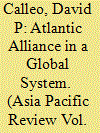

|
|
|
|
|
| Publication |
2007.
|
| Summary/Abstract |
The war in Iraq led to a confrontation between emerging American and European models for global governance. In imagining the future, each has tended to project its own positive experience in the Cold War years. Europeans imagine a multilateral concert, with confederal institutions encouraging mutual appeasement. Americans imagine a benevolent unipolar hegemony. Experience in the 1990s reinforced America's unipolar perspectives. Trends in the new century make Europe's model seem better adapted to an increasingly plural world system. The conclusion speculates on the European model's relevance to Asia. Much will depend on whether China and Japan can replicate the Franco-German reconciliation. China may have more success "containing" the US within a larger Eurasian or even UN context, including, in some fashion, Europe and the US. Conceivably the Western powers may more easily balance their own relations in a Eurasian rather than transatlantic geopolitical framework.
|
|
|
|
|
|
|
|
|
|
|
|
|
|
|
|
| 3 |
ID:
079251
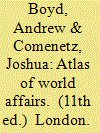

|
|
|
|
|
| Edition |
11th ed.
|
| Publication |
London, Routledge, 2007.
|
| Description |
viii, 254p.Hbk
|
| Standard Number |
9780415391689
|
|
|
|
|
|
|
|
|
|
|
|
Copies: C:1/I:0,R:0,Q:0
Circulation
| Accession# | Call# | Current Location | Status | Policy | Location |
| 052726 | 911/BOY 052726 | Main | On Shelf | General | |
|
|
|
|
| 4 |
ID:
044585
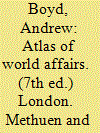

|
|
|
|
|
| Edition |
7th ed.
|
| Publication |
London, Methuen and co. ltd., 1983.
|
| Description |
208p.Pbk
|
| Standard Number |
0416323804
|
|
|
|
|
|
|
|
|
|
|
|
Copies: C:1/I:0,R:0,Q:0
Circulation
| Accession# | Call# | Current Location | Status | Policy | Location |
| 024677 | 911/BOY 024677 | Main | On Shelf | General | |
|
|
|
|
| 5 |
ID:
144741
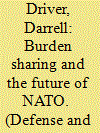

|
|
|
|
|
| Summary/Abstract |
The US role in the North Atlantic Treaty Organization (NATO) Alliance is a 65-year history of retrenchment and renewal. When Washington has sought a retrenchment from the world, it traditionally increased burden sharing pressure on Europe to do more. During times of increased global ambition, the USA reaffirmed its traditional leadership role in the Alliance and its commitment to NATO effectiveness and relevance. This cycle of NATO retrenchment and renewal, however, is halting. Though the USA will continue to go through periods of relative increases and decreases in security policy ambition, signs point to a permanent defense and security retrenchment in Europe. Germany is the ally singularly capable of filling the resulting security gap. If NATO is to avoid the drift toward irrelevance many critics have predicted, Germany will need to cast off old inhibitions toward security and defense leadership. These trends and their implications for NATO's future are explored through historical case studies and the shifting contemporary security environment.
|
|
|
|
|
|
|
|
|
|
|
|
|
|
|
|
| 6 |
ID:
132996
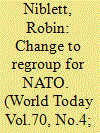

|
|
|
|
|
| Publication |
2014.
|
| Summary/Abstract |
In a world of flashpoints and European defence cuts the alliance needs strengthening, when the British government offered to host the NATO summit in Wales on September,4-5, few foresav that this would be a defining moment in the history of the Atlantic Alliance.
|
|
|
|
|
|
|
|
|
|
|
|
|
|
|
|
| 7 |
ID:
084666
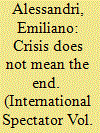

|
|
|
| 8 |
ID:
086945
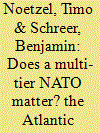

|
|
|
|
|
| Publication |
2009.
|
| Summary/Abstract |
This year NATO will celebrate its 60th anniversary. So far the world's most powerful military alliance has been a remarkable success story. However, as the first decade of the new century draws to a close there appears to be a widening strategic rift among the allies. 'Two-tier NATO' is by now an established piece of shorthand in international strategic debate to indicate an 'alliance à la carte' divided into two or more factions of member states with divergent interests. Evidently, the alliance increasingly struggles to reach consensus on a whole range of strategic issues. So is NATO on a path to disintegration and, ultimately, to failure? This article argues that the organization has developed from a fixed 'two-tier' into a rather fluid 'multi-tier' alliance. On many issues the alliance is in fact divided into several different camps that are pushing in different directions. Thus, allies can be grouped into one of three tiers: a 'reformist', a 'status-quo' and a 'reversal'-oriented one. While the evolution of such a multi-tier alliance will not inevitably result in NATO's demise unmanaged, this manifestation of camps will continuously disrupt the organization's strategic agility. The article finds that if NATO is to maintain strategic vitality, it needs to develop new institutional mechanisms and establish a consensus on its strategic posture in the changing international order and to make 'variable geometry' work.
|
|
|
|
|
|
|
|
|
|
|
|
|
|
|
|
| 9 |
ID:
137530
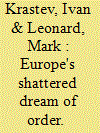

|
|
|
|
|
| Summary/Abstract |
Until recently, most Europeans believed that their post–Cold War security order held universal appeal and could be a model for the rest of the world. This conviction was hardly surprising, since Europe has often played a central role in global affairs. For much of the last three centuries, European order was world order—a product of the interests, ambitions, and rivalries of the continent’s empires. And even during the Cold War, when the new superpowers stood on opposite sides of the continent, the central struggle was between two European ideologies, democratic capitalism and communism, and over control of the European lands in between.
|
|
|
|
|
|
|
|
|
|
|
|
|
|
|
|
| 10 |
ID:
002477
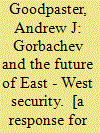

|
|
|
|
|
| Publication |
Washington, D C, Atlantic Council of the United States, 1989.
|
| Description |
24p.
|
|
|
|
|
|
|
|
|
|
|
|
Copies: C:1/I:0,R:0,Q:0
Circulation
| Accession# | Call# | Current Location | Status | Policy | Location |
| 033940 | 320.947/GOO 033940 | Main | On Shelf | General | |
|
|
|
|
| 11 |
ID:
059541
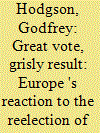

|
|
|
|
|
| Publication |
Winter 2004-05.
|
|
|
|
|
|
|
|
|
|
|
|
|
|
|
|
| 12 |
ID:
137593
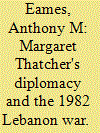

|
|
|
|
|
| Summary/Abstract |
The year 1982 emerged as pivotal in the Atlantic Alliance and the relationship between President Ronald Reagan and Prime Minister Margaret Thatcher. On 6 June 1982, Israeli Defense Forces breached the Lebanese border in a maneuvre to eradicate the Palestinian Liberation Organization. The campaign opened a violent episode in the decades-old Arab-Israeli conflict. Almost immediately the British Foreign and Commonwealth Office recognized the challenge to the international community. The crisis in the Middle East occurred during a period of substantial turnover in the foreign policy communities of both London and Washington. Subsequent improved bilateral relations between the United States and the United Kingdom paved the way for greater cooperation in international diplomacy between respective national executives.
|
|
|
|
|
|
|
|
|
|
|
|
|
|
|
|
| 13 |
ID:
172486
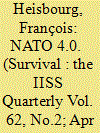

|
|
|
|
|
| Summary/Abstract |
It will be no mean feat to keep US and European decisions relating to China in close enough coordination to prevent a collapse of the transatlantic defence relationship.
|
|
|
|
|
|
|
|
|
|
|
|
|
|
|
|
| 14 |
ID:
032438
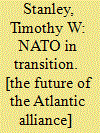

|
|
|
|
|
| Publication |
New York, Frederick A Peaeger pubilshers, 1965.
|
| Description |
xii, 417p.
|
|
|
|
|
|
|
|
|
|
|
|
Copies: C:1/I:0,R:0,Q:0
Circulation
| Accession# | Call# | Current Location | Status | Policy | Location |
| 001952 | 355.03109182/STA 001952 | Main | On Shelf | General | |
|
|
|
|
| 15 |
ID:
132094
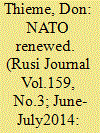

|
|
|
|
|
| Publication |
2014.
|
| Summary/Abstract |
As the NATO summit in Wales approaches, the US debate about the country's international strategy becomes more and more relevant, particularly in the light of recent developments in Eastern Europe and discussions about the role of the Atlantic Alliance post Afghanistan. Don Thieme explores some of the most pressing issues dominating this debate and suggests six reasons why the US needs to remain engaged in a renewed NATO.
|
|
|
|
|
|
|
|
|
|
|
|
|
|
|
|
| 16 |
ID:
094729
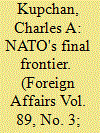

|
|
|
|
|
| Publication |
2010.
|
| Summary/Abstract |
NATO has traditionally treated Russia as a strategic pariah. But now, the West urgently needs Moscow's cooperation on a host of issues. A vision for turning Russia into a productive member of the Euro-Atlantic community is within reach: Russia should join NATO. Although NATO would run a strategic risk by admitting Russia, the Atlantic alliance is actually running a greater strategic risk by excluding it.
|
|
|
|
|
|
|
|
|
|
|
|
|
|
|
|
| 17 |
ID:
059539
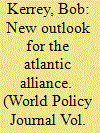

|
|
|
|
|
| Publication |
Winter 2004-05.
|
|
|
|
|
|
|
|
|
|
|
|
|
|
|
|
| 18 |
ID:
086030
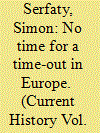

|
|
|
|
|
| Publication |
2009.
|
| Summary/Abstract |
Twenty years after the end of the cold war, expectations run high on both sides of the Atlantic for another renewal of the Atlantic alliance and a relaunching of European integration."
|
|
|
|
|
|
|
|
|
|
|
|
|
|
|
|
| 19 |
ID:
090179
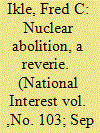

|
|
|
|
|
| Publication |
2009.
|
| Summary/Abstract |
Sixty-two years ago, Dean Acheson warned President Truman that nuclear weaponry was "a discovery more revolutionary in human society than the invention of the wheel"and that "if the invention is developed and used destructively there will be no victor and there may be no civilization remaining." Dean Acheson was certainly no woolly-eyed disarmer. He promoted the Atlantic alliance as a bul-wark against Soviet expansion.Yet, he recommended approaching Stalin to explore international controls for global ban on nuclear weapons.
|
|
|
|
|
|
|
|
|
|
|
|
|
|
|
|
| 20 |
ID:
132087
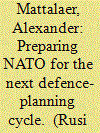

|
|
|
|
|
| Publication |
2014.
|
| Summary/Abstract |
The Atlantic Alliance will be turning more than one corner in 2014. Aside from the end of combat operations in Afghanistan, the year also marks the conclusion of the first cycle of the NATO Defence Planning Process. The arcane world of defence planners arguably represents the principal sphere in which NATO will define a new balance between collective defence and crisis management. Alexander Mattelaer discusses the key debates informing the next defence-planning cycle, and argues that the Wales Summit must provide political guidance for a new level of ambition, extend the planning horizon, and link up with recent European initiatives in the defence-industrial realm.
|
|
|
|
|
|
|
|
|
|
|
|
|
|
|
|
|
|
|
|
|